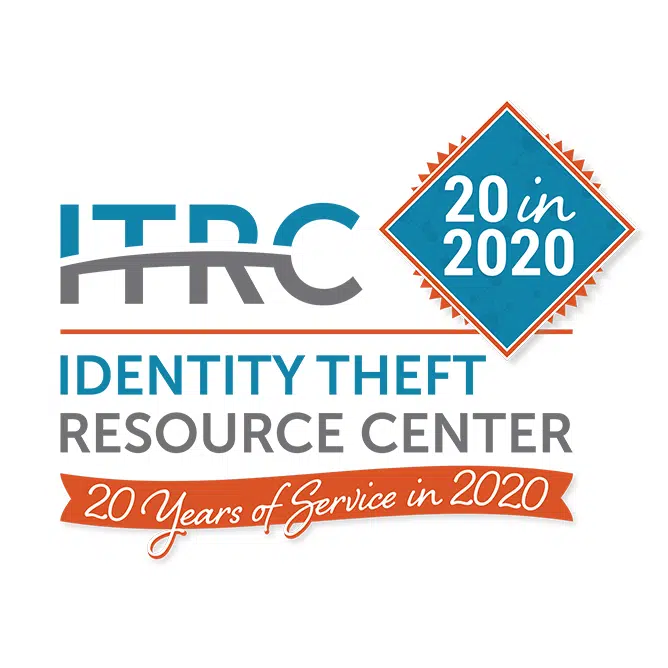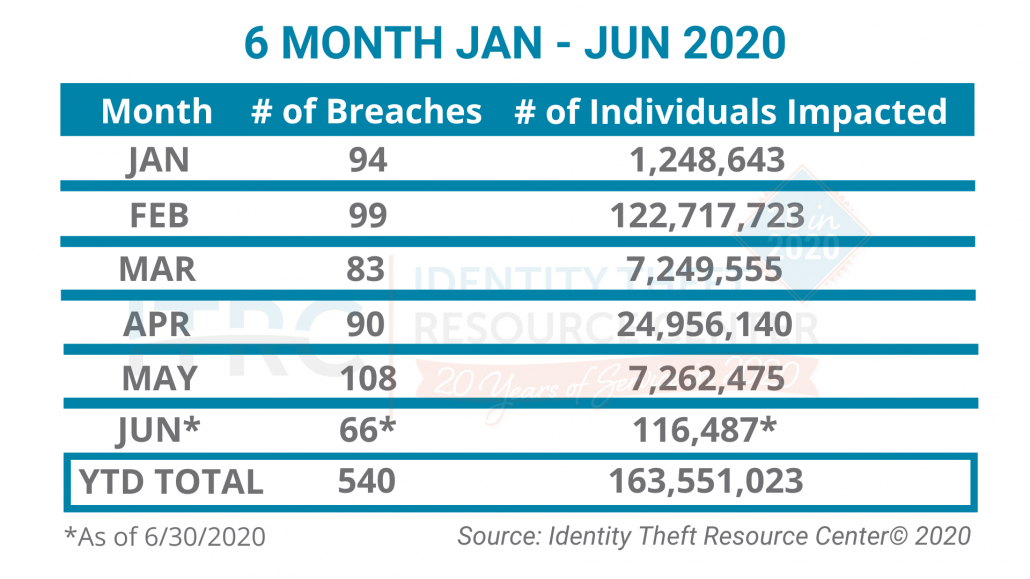Identity Theft Resource Center® Reports 33 Percent Decrease in Data Breaches in the First Half of 2020
Home Help Center Identity Theft Resource Center® Reports 33 Percent Decrease in Data Breaches in the First Half of 2020

The number of individuals impacted by data breaches dropped 66 percent compared to 2019
SAN DIEGO, July 14, 2020 – Today, the Identity Theft Resource Center® (ITRC), a nationally recognized non-profit organization established to support victims of identity crime, released its U.S. data breach findings for the first half of 2020.
According to the data breach analysis, publicly-reported U.S. data breaches have dropped 33 percent in the first half of 2020 compared to the first half of 2019. Impacted individuals have also dropped – 66 percent. Attacks by external threat actors are still the most common cause of a data breach (404 so far in 2020), but compromises caused by internal threat actors are at a three-year low (83 so far in 2020) as more people work from home and have less access to internal systems and data. Data breaches involving third-party contractors and vendors are also down (53 so far in 2020).
Access the Identity Theft Resource Center’s 2020 Six-Month Data Breach Analysis and Key Takeaways here
“The decrease in the number of data breaches and individuals impacted is good news for consumers and businesses overall,” said Eva Velasquez, president and CEO of the Identity Theft Resource Center. “However, the emotional and financial impacts on individuals and organizations are still significant. The impact on individuals may be even more harmful as criminals use stolen personal information to misappropriate government benefits intended to ease the impact of the COVID-19 pandemic. The ITRC will continue to help victims by guiding them on the best ways to navigate the dangers of exposed personal information from a data breach and the risks of identity crime as a result.”
Unless there is a significant uptick in reported data breaches, the ITRC projects 2020 is on pace to see the lowest number of breaches and exposures since 2015. However, the ITRC believes the lower number of breaches is only temporary because cybercriminals are using data stolen in data breaches dating back to 2015 to execute scams, credential stuffing attacks, phishing attacks and fraud that requires identity data.
“With so much data being consumed and so much focus on improved cyber-hygiene at work and home, the available pool of useful data is being reduced,” Velasquez said. “Cybercriminals will have to act to update their data at some point, which will lead to a return to more normal threat patterns. While it is too early to tell when that may occur, it likely won’t happen overnight, but breaches will gradually increase over time.”
For anyone that has been a victim of a data breach, the ITRC recommends downloading its free ID Theft Help app to manage the various aspects of an individual’s data breach case.
Consumers and victims can receive free support and guidance from a knowledgeable live-advisor by calling 888.400.5530 or visiting www.idtheftcenter.org to live-chat.
About the Identity Theft Resource Center
Founded in 1999, the Identity Theft Resource Center® (ITRC) is a nationally recognized non-profit organization established to support victims of identity theft in resolving their cases, and to broaden public education and awareness in the understanding of identity theft, data breaches, cybersecurity, scams/fraud and privacy issues. Through public and private support, the ITRC provides no-cost victim assistance and consumer education through its contact center, website, social media channels, live chat feature and ID Theft Help app. For more information, visit: http://www.idtheftcenter.org
MEDIA CONTACT:
Identity Theft Resource Center
Charity Lacey
VP of Communications
O: 858-634-6390
C: 619-368- 4373
[email protected]
How much information are you putting out there? It’s probably too much. To help you stop sharing Too Much Information, sign up for the In the Loop.
Get ID Theft News
Stay informed with alerts, newsletters, and notifications from the Identity Theft Resource Center



